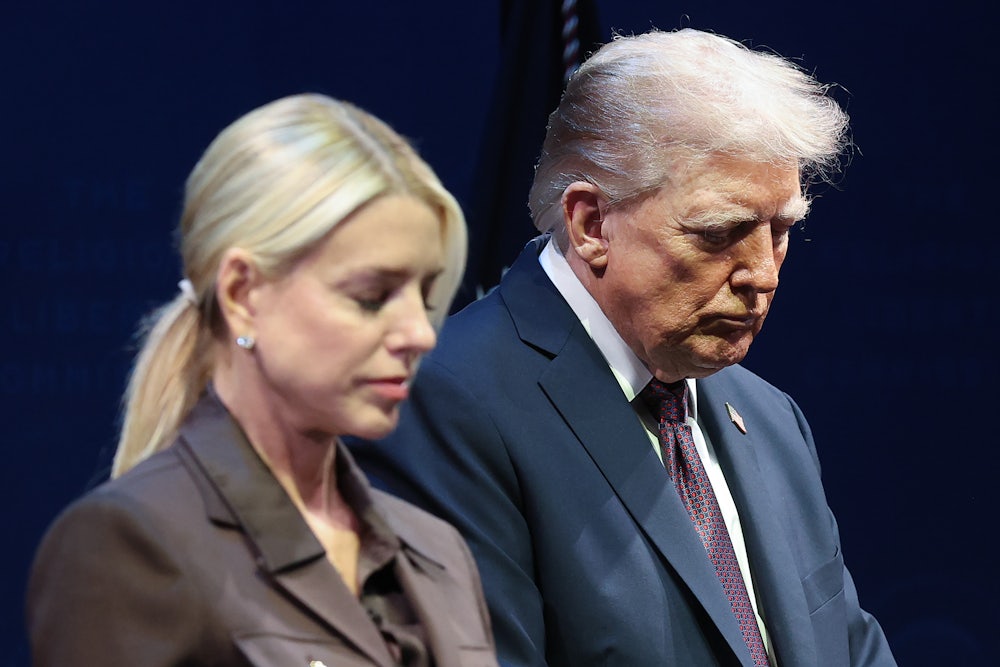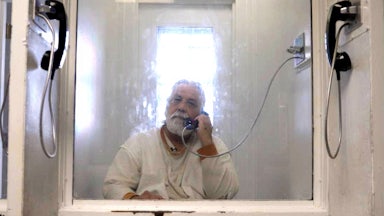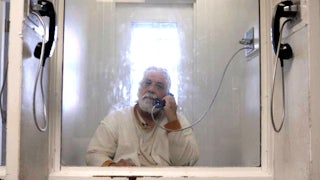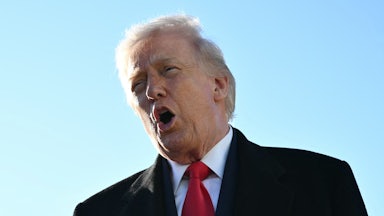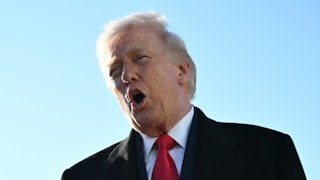Well, well, well, not so easy to find someone who can prosecute your political enemies, is it?
President Donald Trump published a lengthy post on his personal social media website over the weekend addressed to Attorney General Pam Bondi. In the missive, he openly demanded that she take aggressive steps to prosecute his political enemies. In previous administrations, this sort of thing would have been a Watergate-level scandal. For Trump, it was just Saturday. It is worth reading the post in its entirety:
Pam: I have reviewed over 30 statements and posts saying that, essentially, “same old story as last time, all talk, no action. Nothing is being done. What about Comey, Adam ‘Shifty’ Schiff, Leticia??? They’re all guilty as hell, but nothing is going to be done.” Then we almost put in a Democrat supported U.S. Attorney, in Virginia, with a really bad Republican past. A Woke RINO, who was never going to do his job. That’s why two of the worst Dem Senators PUSHED him so hard. He even lied to the media and said he quit, and that we had no case. No, I fired him, and there is a GREAT CASE, and many lawyers, and legal pundits, say so. Lindsey Halligan is a really good lawyer, and likes you, a lot. We can’t delay any longer, it’s killing our reputation and credibility. They impeached me twice, and indicted me (5 times!), OVER NOTHING. JUSTICE MUST BE SERVED, NOW!!! President DJT
Much of the statement refers to unknown sources, comments, and pundits. It is unclear, for example, what Trump is referencing with “over 30 statements or posts.” But the thrust of it is simple. The U.S attorney’s office in the Eastern District of Virginia was reportedly unwilling to prosecute Trump’s political opponents because of a lack of evidence against them, and Trump is demanding that the case be pursued anyway.
Trump also appeared to be confused with how the U.S. attorney’s office works. This is a little surprising given how often he’s been prosecuted and investigated over the last decade. The federal prosecutor to whom he referred is Erik Siebert, who previously served as an assistant U.S. attorney in the Eastern District of Virginia office, or EDVA for short. That office covers the suburbs of Northern Virginia that surround Washington, D.C.’s eastern flank.
Since the inauguration, Siebert has worked as the acting U.S. attorney for EDVA and was reportedly in line for the permanent gig. While Trump highlighted that Virginia’s two Democratic senators supported Siebert’s temporary assignment and permanent nomination, the real impetus reportedly came from Virginia Governor Glenn Youngkin, in whose office Siebert’s father currently works. Over the last week, it was reported that Siebert faced pressure from Trump over the lack of progress on the investigations, which Siebert reportedly thought to be unsupported by the available evidence. Siebert resigned on Friday after the president made his criticism public.
The Justice Department already revealed earlier this summer, in an unusual breach of protocol, that it was investigating former FBI Director James Comey, whom Trump fired a few months into his first term over the Russia investigation, and former CIA Director John Brennan for unspecified offenses. (Trump’s post did not mention Brennan for unclear reasons.) As for California Senator Adam Schiff and New York Attorney General Letitia James, Trump is apparently trying to target his former investigators. Schiff led the House Judiciary Committee probes into Trump for both of his impeachments when he served in that chamber, while James is overseeing the fraud case against the Trump Organization itself.
It is unclear what crime, if any, Comey could have committed or whether it would still be prosecutable by now under the statute of limitations. Bill Pulte, the Trump-installed head of the Federal Housing Finance Agency, publicly claimed over the summer that Schiff and James had engaged in a type of mortgage fraud by declaring multiple properties to be primary residences. Trump used Pulte’s claims against Federal Reserve Governor Lisa Cook as a pretext to fire her in late August.
There is good reason to believe that Pulte is not acting in good faith here. He announced his “findings” and his referral of them to the Justice Department on social media, in what some observers took as an attempt to curry favor with the president. It is unclear to what extent Pulte’s claims could actually be prosecuted—a Reuters investigation found that his own family members had done the same thing. And, perhaps most importantly, a separate New York Times investigation found that Cook correctly represented her intentions with the properties to the banks with whom she obtained the mortgages. If similar flaws marred the allegations against Schiff and James, it would explain why federal prosecutors have not acted on them.
It is surprising that Trump doesn’t actually know how the criminal justice system works despite his extensive interactions with it over the past decade. It is not a federal crime for the president to be mad at you. Nor is it a simple matter to bring charges against people, especially when they have the resources to defend themselves. Nor is it possible for the Justice Department to simply throw people in jail whenever it wants.
This is particularly evident in the cases brought by Jeanine Pirro, a former Fox News anchor who currently serves as the U.S. attorney for the District of Columbia. In that role, she has overseen felony prosecutions for people charged amid Trump’s highly publicized occupation of the nation’s capital. It hasn’t been pretty. Multiple cases have fallen apart when federal grand juries no-billed them. A common legal joke is that a prosecutor could get a grand jury to indict a ham sandwich; Pirro’s office couldn’t even get one to sign off on federal assault charges for a guy who threw a Subway sandwich at federal agents in August.
In addition to grand jury issues, a federal prosecutor pursuing a case against Comey, Schiff, or James with anything less than solid evidence would have to contend with a deeply skeptical federal court system. Federal judges have increasingly said that they won’t grant the Trump administration the presumption of regularity—a legal term for taking the government at its word in some proceedings—after its handling of deportation cases.
Judges also read newspapers and watch TV; they would know that these cases are coming from the White House instead of a nonpartisan civil servant or a good-faith officer of the court. The president did not help matters by making clear that his goal was personal retribution. “They impeached me twice, and indicted me (5 times!), OVER NOTHING,” Trump claimed in his post. “JUSTICE MUST BE SERVED, NOW!!!” That line might play well at a Trump rally, but it does not work in a court of law.
Trump’s biggest problem is that he can’t simply turn the tables on his foes. He actually stood credibly accused of criminal offenses, while his political opponents do not. A New York jury even convicted him on 34 counts of falsifying business records for channeling hush-money payments to Stormy Daniels, an adult-film actress with whom he had an extramarital affair, through the Trump Organization, ahead of the 2016 election. Though he managed to escape a prison sentence for the convictions, he nonetheless became the first former U.S. president to be convicted of a felony.
In three other cases, Trump was charged with a criminal offense but escaped prosecution or trial through other means. The Georgia election case ground to a halt after judges suspended Fulton County District Attorney Fani Willis for improperly hiring a romantic partner on the case. The Mar-a-Lago documents case foundered after Judge Aileen Cannon, a Trump appointee who consistently bent the law in his favor, claimed special counsel Jack Smith had been illegally appointed. And the federal-election fraud case, also led by Smith, collapsed after the Supreme Court invented “presidential immunity” out of thin air to shield Trump from consequences in Trump v. United States.
While Trump was not convicted of a crime in those three prosecutions, his role in the underlying events are historical fact. Trump did, in fact, abscond with classified material to Mar-a-Lago and store it in unsecured places. Trump did, in fact, call the Georgia secretary of state and ask him to “find” enough votes to win the state after the 2020 election. Trump did, in fact, lead a fraudulent campaign to overturn the 2020 election results, which resulted in the January 6, 2021, attack on Congress to halt the electoral vote counts. These were not “witch hunts,” as Trump claimed, even if the cases ultimately fell apart for other reasons.
In the president’s head, he was an innocent victim of partisan prosecutions and baseless witch hunts for most of the last decade, and he wants to do the same thing to his enemies now that he’s back in power. There are some countries where this is possible, like Russia and Hungary and other paranoid personalist regimes. But the United States is not currently one of them—at least, not yet.
